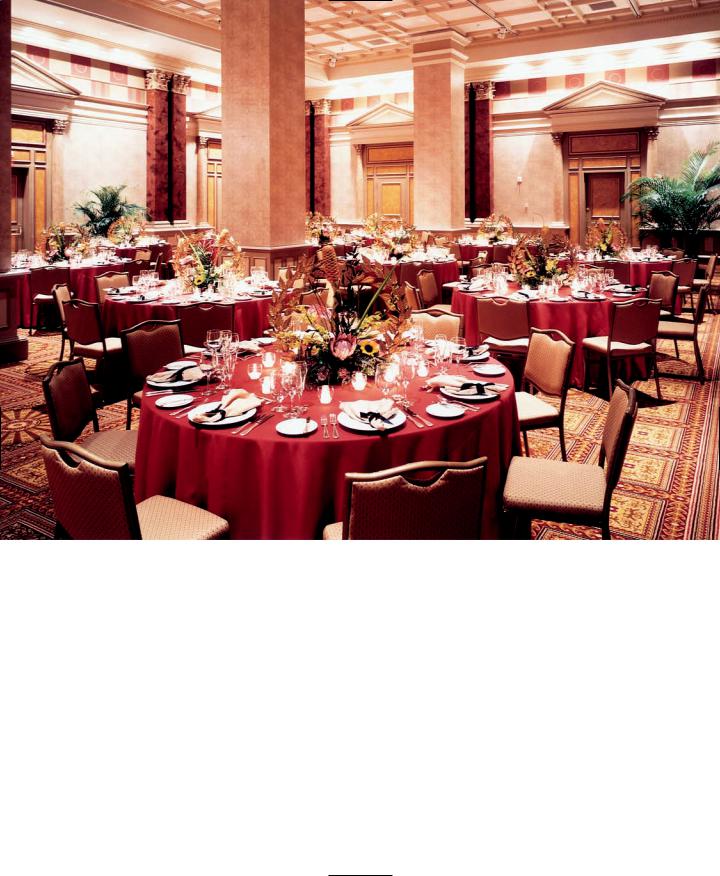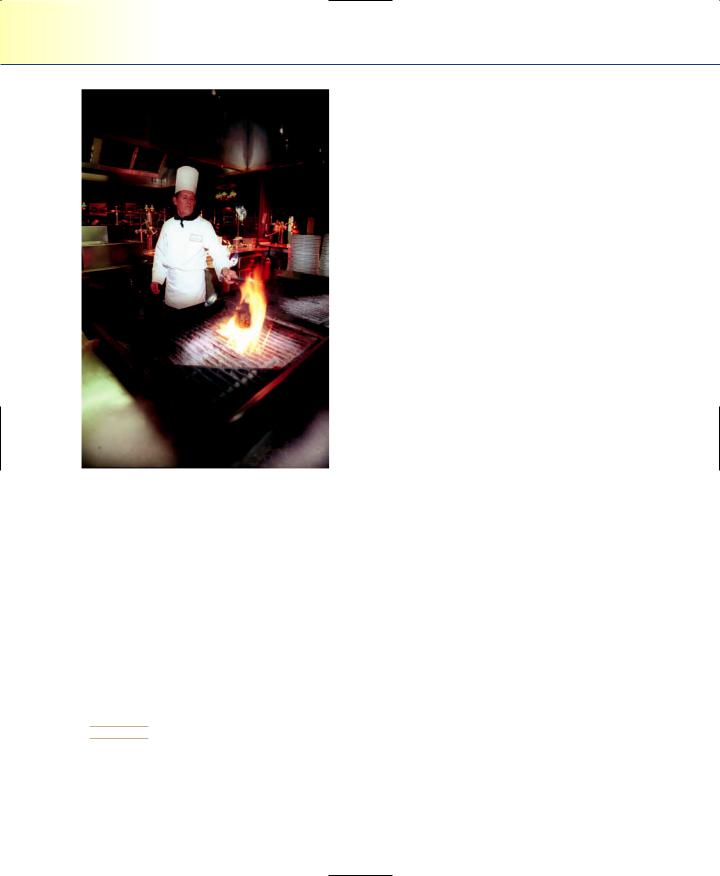
- •CONTENTS
- •PREFACE
- •Content—Benefits for Students
- •Content—Benefits for Instructors
- •Features of the Book for Students and Instructors
- •Supplementary Materials
- •Acknowledgments
- •What Is Hospitality Management?
- •The Manager’s Role in the Hospitality Industry
- •Why Study in a Hospitality Management Program?
- •Planning a Career
- •Employment as an Important Part of Your Education
- •Getting a Job
- •Employment at Graduation
- •The Outlook for Hospitality
- •Summary
- •Managing Change
- •Demand
- •Supply
- •Workforce Diversity
- •The Impact of Labor Scarcity
- •Summary
- •The Varied Field of Food Service
- •The Restaurant Business
- •The Dining Market and the Eating Market
- •Contemporary Popular-Priced Restaurants
- •Restaurants as Part of a Larger Business
- •Summary
- •Restaurant Operations
- •Making a Profit in Food Service Operations
- •Life in the Restaurant Business
- •Summary
- •Chain Restaurant Systems
- •Independent Restaurants
- •Franchised Restaurants
- •Summary
- •Competitive Conditions in Food Service
- •The Marketing Mix
- •Competition with Other Industries
- •Summary
- •Self-Operated Facilities
- •Managed-Services Companies
- •Business and Industry Food Service
- •College and University Food Service
- •Health Care Food Service
- •School and Community Food Service
- •Other Segments
- •Vending
- •Summary
- •Consumer Concerns
- •Food Service and the Environment
- •Technology
- •Summary
- •The Evolution of Lodging
- •Classifications of Hotel Properties
- •Types of Travelers
- •Anticipating Guest Needs in Providing Hospitality Service
- •Service, Service, Service
- •Summary
- •Major Functional Departments
- •The Rooms Side of the House
- •Hotel Food and Beverage Operations
- •Staff and Support Departments
- •Income and Expense Patterns and Control
- •Entry Ports and Careers
- •Summary
- •The Economics of the Hotel Business
- •Dimensions of the Hotel Investment Decision
- •Summary
- •The Conditions of Competition
- •The Marketing Mix in Lodging
- •Product in a Segmented Market
- •Price and Pricing Tactics
- •Place—and Places
- •Promotion: Marketing Communication
- •Summary
- •The Importance of Tourism
- •Travel Trends
- •The Economic Significance of Tourism
- •The United States as an International Tourist Attraction
- •Businesses Serving the Traveler
- •Noneconomic Effects of Tourism
- •Summary
- •Motives and Destinations
- •Mass-Market Tourism
- •Planned Play Environments
- •Casinos and Gaming
- •Urban Entertainment Centers
- •Temporary Attractions: Fairs and Festivals
- •Natural Environments
- •On a Lighter Note. . .
- •Summary
- •Management and Supervision
- •The Economizing Society
- •The Managerial Revolution
- •Management: A Dynamic Force in a Changing Industry
- •What Is Management?
- •Summary
- •Why Study Planning?
- •Planning in Organizations
- •Goal Setting
- •Planning in Operations
- •The Individual Worker as Planner
- •Long-Range Planning Tools
- •Summary
- •Authority: The Cement of Organizations
- •Departmentalization
- •Line and Staff
- •Issues in Organizing
- •Summary
- •Issues in Human-Resources Management
- •Fitting People to Jobs
- •Recruiting
- •Selection and Employment
- •Training
- •Retaining Employees
- •Staff Planning
- •Summary
- •The Importance of Control
- •Control and the “Cybernetic Loop”
- •Tools for Control
- •Summary
- •Leadership as Viewed by Social Scientists
- •Why People Follow
- •Leadership Theories
- •Communication
- •The Elements of Leading and Directing
- •Developing Your Own Leadership Style
- •Summary
- •A Study of Service
- •Rendering Personal Service
- •Managing the Service Transaction
- •How Companies Organize for Service
- •Summary
- •INDEX

Hotel Food and Beverage Operations |
321 |
the steps necessary to exercise reasonable care. While increased technology as described above helps in offering more effective security option, the human element of having a sufficient number of well-trained security employees cannot be minimized. Just the presence of security equipment, whether electronic locks or CCTV systems, does not guarantee guests’ safety. Only trained staff who know how to observe guest activities and respond appropriately should monitor the CCTV system. A written guide should, in addition, provide specific instructions for various emergencies with detailed response information also covered in training. There is no substitute for well-trained security staff, in sufficient numbers, to implement a comprehensive, well-thought-out security plan that ultimately involves all hotel employees.8
In essence, every employee of a hotel is part of the security team in staying constantly aware of what is happening in every area of the hotel property, being observant of suspicious occurrences, and following a standardized reporting system in a timely fashion.
Hotel Food and Beverage Operations
Originally, the hotel restaurant was designed to give a traveler in a strange city a place to eat where the food would be good, or at least palatable—and safe to eat.
In recent years, however, the restaurant industry has grown in diversity of both concepts and menus. Moreover, that growth has meant the spread of restaurants into more and more locations, making restaurant food service readily available. Many successful chain restaurants carry well-known brand names to which travelers are accustomed. In the face of stiffening restaurant competition for the hotel guest’s food and beverage patronage, some hoteliers have developed hotels, such as the economy and all-suite properties discussed in Chapter 9, that offer only very limited food service—usually a complimentary breakfast and, in all-suite operations, complimentary cocktails in the evening.
On the other hand, in full-service hotels, the food service operation continues to be not only a vital service but a key competitive weapon. Many full-service hotels have several quite different food outlets. For example, one urban full-service convention hotel offers a gourmet penthouse Russian restaurant, an authentic Polynesian restaurant, a more traditional three-meal restaurant, and a take-out service for guests needing food items on the go. All of these are in addition to the room service option. A 24-hour operating room service department is expected for five-star and five-diamond hotels.
Creative approaches in hotel food and beverage operations are not limited to varied theme restaurants within the hotel. For example, several Ritz-Carlton hotels feature a chef’s table where four guests can eat in the kitchen and watch and interact with the chef during the preparation of a five-course meal.9

Hotel restaurants, such as the Bacchanal Restaurant in Caesars Atlantic City, often adopt themes that add to the overall experience. (Courtesy of Caesars Atlantic City.)
Offering several restaurant outlets extends the services available to the guest—and helps keep the guest’s food business in the hotel. In a recent listing of Mobil Travel Guide’s five-star restaurants in the United States, many are located in hotels. Renowned restaurants, located in hotels, have the added advantage of spotlighting the hotel’s identity and bringing in out-of-town guests as well as local clientele who may, in turn, refer guests to the hotel.10
Many hotels in recent years have emphasized the food and beverage department’s role as a profit center, that is, a specifically identified, profitable part of the hotel’s operation. The typical hotel food and beverage department in the United States creates about half as much in dollar sales as does the rooms department but generally provides only between 10 and 20 percent as much profit.
BANQUETS
Some large properties offer a catering department (or banquet department) headed by a catering manager who books and sells banquets. Smaller properties include this activity among the restaurant manager’s duties. Larger properties have special fulland part-time banquet service staffs. Smaller properties draw banquet service personnel from their regular crew and often supplement them with part-time employees.
Banquets are often profitable, but once again, in many properties the banquet menus and banquet rooms are meant principally to serve the rooms department. Thus, a meeting may occupy one conference room all day. Perhaps the hotel supplies a coffee break and a luncheon in another room. Typically a hotel would waive charges for the meeting room if a sufficient number of guest rooms are being reserved or if the food and beverage revenue are high enough. If such a meeting accounts for 20 or 30 guest room rentals—or even only 10 or 15—the logic we have mentioned before clearly applies. The 70 percent profit on room sales makes this use of banquet space desirable.
322

Banquet space can be used to sell guest rooms by accommodating groups, associations, and organizations. (Courtesy of Caesars Atlantic City.)
FOOD PRODUCTION
In most properties, the person in charge of food production is called the executive chef. A chef is a person who has completed, either formally or informally, the training that qualifies him or her to be an excellent professional cook. The chef should also be an effective manager who can purchase food; hire, train, and discipline employees; and plan appetizing meals priced to yield a profit. A highly experienced, well-trained chef capable of large-scale food production is an investment for the typical hotel. Salaries of such chefs are very competitive. A skilled, talented chef, however, will usually help the success of the hotel’s food and beverage operation, thereby offering a good return on the investment.
323

324 |
Chapter 10 Hotel and Lodging Operations |
An increasingly common title in American food service is food production manager. Although these managers are almost invariably accomplished cooks, they emphasize kitchen management and rely on strict adherence to written recipes, rather than on their craft skills, to ensure quality. The type of management chosen by a property generally reflects the dollar volume of food sales. More sales may permit the expense of a chef or food production manager. Smaller properties may have to content themselves with a head or lead cook. In this case, the restaurant manager generally works more closely with the kitchen.
With the greater availability of quality frozen prepared foods as well as the growing acceptance of limited menus, an approach to food service that requires limited culinary skills is becoming more and more common in hotels that don’t try to reach the full-service or luxury standards.
Large convention properties may support a separate banquet sub-department of workers who prepare only banquet food. Some properties even use a separate banquet kitchen and have a designated banquet chef. The banquet culinary team of a hotel has tremendous opportunity in impacting the hotel’s food and bev-
erage reputation because of the volume of people served. A large convention hotel could serve several hundred or even several thousand individuals through banquet operations.
Hotels may also have additional specialized culinary sections of the main kitchen. These specialization areas include the garde manger area (where cold appetizers and salads are prepared), a butchering section, and a pastry shop (involving baking breads and preparing pastries and desserts). Typically, larger hotels or upscale, luxury hotels will have these specialized culinary sections.
SANITATION AND UTILITY
CAREERS IN HOSPITALITYQ
Sanitation is so important that many hospitality programs offer entire courses on the subject. Our purpose here is simply to repeat the point made in Chapter 4 regarding the importance of dishwashers, pot washers, and the cleanup crew often referred to in hotels as the stewarding department. In Chapter 3, we noted that many students find that the only summer jobs available are in these areas. They may not be the most
